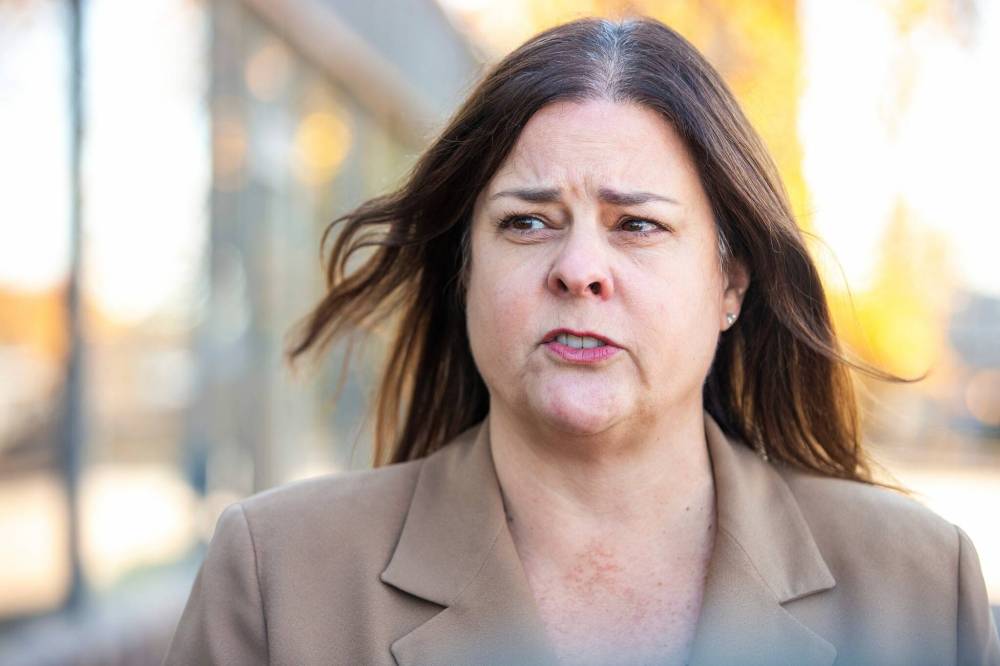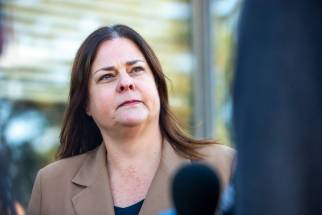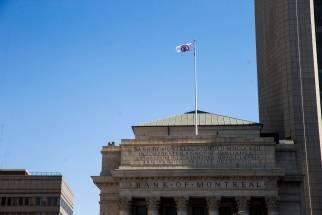Stefanson under fire for using secret email address Private messages during protests didn’t break FOI rules, but critics say premier evaded democratic expectations
Read this article for free:
or
Already have an account? Log in here »
To continue reading, please subscribe:
Monthly Digital Subscription
$0 for the first 4 weeks*
- Enjoy unlimited reading on winnipegfreepress.com
- Read the E-Edition, our digital replica newspaper
- Access News Break, our award-winning app
- Play interactive puzzles
*No charge for 4 weeks then price increases to the regular rate of $19.00 plus GST every four weeks. Offer available to new and qualified returning subscribers only. Cancel any time.
Monthly Digital Subscription
$4.75/week*
- Enjoy unlimited reading on winnipegfreepress.com
- Read the E-Edition, our digital replica newspaper
- Access News Break, our award-winning app
- Play interactive puzzles
*Billed as $19 plus GST every four weeks. Cancel any time.
To continue reading, please subscribe:
Add Free Press access to your Brandon Sun subscription for only an additional
$1 for the first 4 weeks*
*Your next subscription payment will increase by $1.00 and you will be charged $16.99 plus GST for four weeks. After four weeks, your payment will increase to $23.99 plus GST every four weeks.
Read unlimited articles for free today:
or
Already have an account? Log in here »
Hey there, time traveller!
This article was published 18/10/2022 (1146 days ago), so information in it may no longer be current.
Premier Heather Stefanson is using a secret email address for government communication, raising concerns about a lack transparency and accountability.
The premier’s use of a confidential government email account came to light in a Freedom of Information and Protect of Privacy Act request seeking executive council correspondence regarding the federal Emergencies Act.
A Feb. 14 email message saying “Good idea, Premier” concerning the federal Emergencies Act was sent to a name and email address redacted in its entirety, without identifying the premier or a government email domain.
MIKAELA MACKENZIE / WINNIPEG FREE PRESS FILES Premier Heather Stefanson’s press secretary said it is a government email address and that the FIPPA officer decided to redact based on section 24 (a) of the act.
It was part of an email exchange among the premier’s inner circle at the time the federal government was invoking the act in response to border blockades and so-called “freedom convoy” protesters occupying Memorial Boulevard and the area around Parliament Hill. It is now the subject of a federal inquiry taking place in Ottawa.
When asked why the premier’s name and email address were redacted — including the domain name — Stefanson’s press secretary said it is a government email address and that the FIPPA officer decided to redact based on section 24 (a) of the act. That section of FIPPA states that they may refuse to disclose information “if disclosure could reasonably be expected to threaten or harm the mental or physical health or the safety of another person.”
The revelation is raising concerns among both inside and outside the Legislative Building.
Judge to hear Liberal leader’s request next month
A date has been set for a Court of King’s Bench judge to decide whether a complaint alleging Premier Heather Stefanson violated provincial conflict of interest rules when she failed to disclose $31 million in property sales in 2016 and 2019 should be heard by the court.
Liberal Leader Dougald Lamont paid a $300 court fee and made an application last spring asking a judge to decide whether the case should be heard by another judge.
The request will be heard Nov. 30.
The only way to hold a member of the Manitoba Legislative Assembly to account if they’re alleged to have violated the Legislative Assembly and Executive Council Conflict of Interest Act is for a voter to go to court, pay the fee and file an affidavit detailing the complaint.
If a hearing is granted and a judge determines conflict-of-interest rules were broken, the MLA could be suspended for up to 90 days, pay a fine of up to $5,000, be removed from office and have to pay restitution to the government or Crown agency for any financial gain that resulted from the violation.
In January, after it was reported in the Free Press, Stefanson acknowledged she didn’t disclose the property sales to the conflict of interest commissioner as required by law and that it was an “oversight” for which she was sorry.
Although she has admitted to violating conflict of interest legislation by not disclosing, Stefanson plans to fight the complaint.
— Carol Sanders
The co-founder of Democracy Watch in Toronto said it’s fine for the premier to be using a secret internal government email address to avoid being bombarded with messages from the public, but its existence should have been proactively disclosed so anyone filing freedom of information requests was made aware.
“It has to be a government address that’s searchable under access to information requests,” said Duff Conacher. “If not, then it’s the same as having a personal private email address.”
Paul Thomas, who researches and writes regularly on freedom of information laws, questioned the rationale for the premier using a secret address.
“This seems like a deliberate tactic to evade the requirement to document for purposes of accountability and history the decisions and actions taken by public office-holders — both elected politicians and appointed public servants,” the University of Manitoba political studies professor emeritus said.
“It is part of a broader defensive strategy that governments of all partisan stripes have adopted to blunt the operation of FOI laws. It is politically convenient to have an untraceable email channel, but it should not be part of the government email system.
“If the premier’s mental health is endangered by threatening emails, she could have her incoming messages filtered by political staff, just as old-fashioned physical mail is screened before being forwarded to the prime minister in Ottawa,” he said.
The Feb. 14 email that included the premier but did not identify her was sent by deputy minister of intergovernmental affairs Michael Richards to clerk of the executive council Don Leitch and others, including Jordan Sisson — Stefanson’s chief of staff at the time — and special adviser Bonnie Staples-Lyon, and was cc’d to a redacted email address that belonged to the premier. Her response to the email is also redacted.
The email summarizes what invoking the Emergencies Act is intended to do: “protect Canadians, jobs (and) confidence in our institutions,” and that it is not to be used for military action or limiting free speech and lawful assembly.
The Feb. 14 email arrived days after Stefanson pleaded in a private letter to Prime Minister Justin Trudeau to intervene at the Emerson border blockade before she publicly opposed his decision to enact the Emergencies Act against protesters.
In a Feb. 11 letter obtained by the Free Press, Stefanson asked Trudeau to take “immediate and effective” action, pleading for “national leadership that only you and the federal government can provide.”
Days later, at a news conference, Stefanson said local leaders had the situation under control, and she feared if the federal government wielded power under the Emergencies Act, it would “escalate situations.”
Now, as the use of the act is under the microscope during a federal inquiry, Manitoba has standing at the proceedings but will not be taking part.
“Manitoba stated its opposition to the use of the Emergencies Act when it was enacted and continues to oppose its use,” a Justice Department spokesman said in a statement.
“Manitoba has already provided information and will provide further information to the commission, however, the commission itself has determined that it has no need to call any witnesses from the Government of Manitoba.”
MIKAELA MACKENZIE / WINNIPEG FREE PRESS FILES The NDP accused Heather Stefanson of using a “back channel” to communicate sensitive political information about the Emergencies Act “in a way that escapes the scrutiny and the accountability” that FIPPA was designed to prevent.
The NDP accused Stefanson of using a “back channel” to communicate sensitive political information about the Emergencies Act “in a way that escapes the scrutiny and the accountability” that FIPPA was designed to prevent.
Although using a secret email account doesn’t break any rules, it breaks the spirit of freedom of information rules, said NDP finance critic and lawyer Mark Wasyliw.
“We want our government decision makers to be held accountable and to be transparent in their dealings, and for Manitobans to have the opportunity to review how decisions are made and by whom and what sort of thought processes went into them,” said Wasyliw. “It is a foundational aspect of our democracy that we have this type of open government.
“This is a premier who has a history of violating ethics rules in our legislature,” he said, pointing to her failure to disclose $31 million in property sales in 2016 and 2019.
carol.sanders@freepress.mb.ca

Our newsroom depends on a growing audience of readers to power our journalism. If you are not a paid reader, please consider becoming a subscriber.
Our newsroom depends on its audience of readers to power our journalism. Thank you for your support.
History
Updated on Tuesday, October 18, 2022 8:12 PM CDT: Fixes typo













